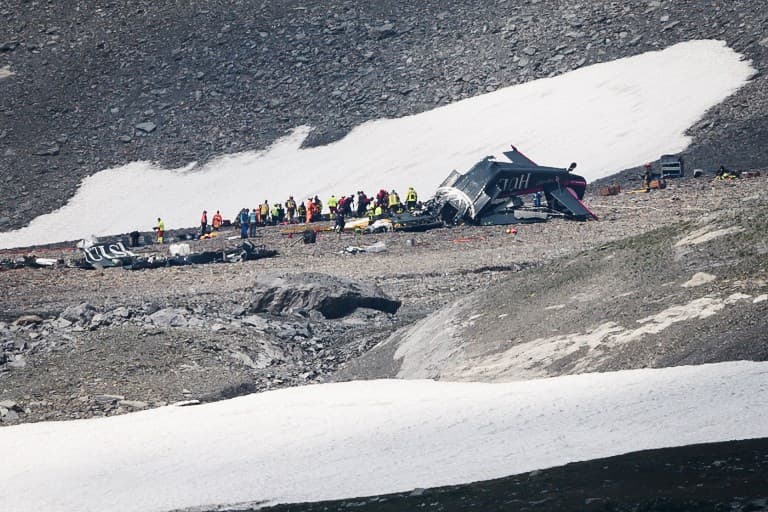New rules for vintage JU-Air flights after deadly crash

In the wake of a deadly crash earlier this month, Swiss authorities have laid out new regulations for flights involving vintage Junkers Ju-52 planes operated by the JU-Air airline.
The Swiss airline voluntarily suspended flight operations after its 79-year-old Junker JU52 HB-HOT plane crashed into the Piz Segnas mountain, in the eastern canton of Graubünden, at an altitude of 2,540 metres on August 4th. All 20 people on board, including three crew members, were killed.
Now with JU-Air set to resume flights on Friday, the Federal Office of Civil Aviation (FOCA) has specified three conditions.
In a statement, the agency noted there were no indications of a general technical problem with the Junker planes.
But FOCA stated the planes would, for the foreseeable future, have to fly above the minimum legal altitude. In addition, the aircraft must also now be equipped with a GPS data logger for post-flight analysis of routes taken.
Lastly, passengers will also be required to wear seat belts on the Junker aeroplanes and will be forbidden from moving around the craft during flights.
The cause of the August 4th crash remains unknown and the Swiss Transport Safety Investigation Board (STSB) is still investigating the incident involving the plane which was not equipped with a black box.
The Swiss civil aviation authority said on Thursday the investigation could take weeks or months. It said a flight ban would be considered for the vintage planes if a technical problem was discovered during that investigation.
In a press statement, JU-Air welcomed the rapid response from FOCA and said it would comply fully with the new rules.
The JU-52 HB-HOT aircraft which crashed in the Alps on August 4th was built in 1939 and had completed 10,187 flight hours. It had to be serviced every 35 flight hours and underwent its last technical check-up in late July, only a few days before the fatal crash en route from Locarno, in the canton of Ticino, to Ju-Air's base in Dübendorf, in the canton of Zurich.
Both pilots were experienced and had flown for Swissair and the military for more than 30 years, according to a JU-Air statement.
Comments
See Also
The Swiss airline voluntarily suspended flight operations after its 79-year-old Junker JU52 HB-HOT plane crashed into the Piz Segnas mountain, in the eastern canton of Graubünden, at an altitude of 2,540 metres on August 4th. All 20 people on board, including three crew members, were killed.
Now with JU-Air set to resume flights on Friday, the Federal Office of Civil Aviation (FOCA) has specified three conditions.
In a statement, the agency noted there were no indications of a general technical problem with the Junker planes.
But FOCA stated the planes would, for the foreseeable future, have to fly above the minimum legal altitude. In addition, the aircraft must also now be equipped with a GPS data logger for post-flight analysis of routes taken.
Lastly, passengers will also be required to wear seat belts on the Junker aeroplanes and will be forbidden from moving around the craft during flights.
The cause of the August 4th crash remains unknown and the Swiss Transport Safety Investigation Board (STSB) is still investigating the incident involving the plane which was not equipped with a black box.
The Swiss civil aviation authority said on Thursday the investigation could take weeks or months. It said a flight ban would be considered for the vintage planes if a technical problem was discovered during that investigation.
In a press statement, JU-Air welcomed the rapid response from FOCA and said it would comply fully with the new rules.
The JU-52 HB-HOT aircraft which crashed in the Alps on August 4th was built in 1939 and had completed 10,187 flight hours. It had to be serviced every 35 flight hours and underwent its last technical check-up in late July, only a few days before the fatal crash en route from Locarno, in the canton of Ticino, to Ju-Air's base in Dübendorf, in the canton of Zurich.
Both pilots were experienced and had flown for Swissair and the military for more than 30 years, according to a JU-Air statement.
Join the conversation in our comments section below. Share your own views and experience and if you have a question or suggestion for our journalists then email us at [email protected].
Please keep comments civil, constructive and on topic – and make sure to read our terms of use before getting involved.
Please log in here to leave a comment.